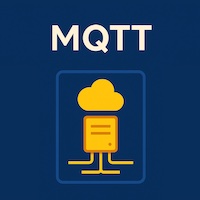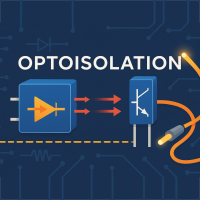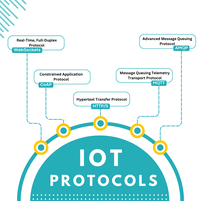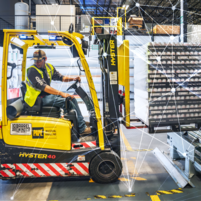IoT for consumers

Consumer IoT is primarily concerned with making life easier for end-users. How to get more done with fewer resources is the focus here. Personal or social happiness is the primary motivator for people, and they prefer to delegate responsibility for their work to others. Humans need a sense of well-being regardless of weather, temperature, rain, or shine.
What does the term "Internet of Things" mean?
The "Internet of Things" (IoT) is a phrase used to describe the network of interconnected gadgets. Sensors in anything from thermostats and industrial equipment to printers, TVs, and even refrigerators may be found in these devices.
Internet of things (IoT) technology may be used for a broad range of personal and professional purposes. Amazon's Echo Dot and logistics-oriented applications are two good examples. There has been a significant increase in IoT usage over the last several years as a consequence of consumers and businesses taking advantage of its many benefits.
IoT technology may have a significant impact on a company's productivity and efficiency, particularly when it comes to business processes and operations. One other thing that must be said before we go into it is that technology based on the Internet of Things offers end consumers substantial benefits that should not be overlooked. Consider the benefits of the Internet of Things (IoT) for organizations, especially for staff who must spend time away from the office, like salespeople or technicians.
The Benefits for the Consumers
The Internet of Things is a boon for businesses that employ people in these fields, and those workers will be among the first to reap the benefits of this windfall. Employee engagement improved as a result of widespread IoT deployment, according to one study's results, leading to the following outcomes:
A rise in productivity and production
Enhancements in one's ability to do one's job properly, as well as better customer service.
More and more internet-of-things solutions are now on the market, helping people improve their convenience and, dare we say, laziness. Smart cities, smart homes, smart workplaces, and even linked autos are all on the table. What about a deeper look at each one?
Coziness and Effortlessness at its finest
Getting out of a warm, cozy bed to switch off the television or light has always made me dread doing so. The Internet of Things is a source of joy for many people. The Internet of Things (IoT) solves that issue.
Sensors throughout your home allow your home to learn your preferences and adjust its behavior following them. Additionally, it may be capable of turning on or off various household appliances such as light bulbs and televisions and playing the music of your choice.
Using the Internet of Things, your car can recognize when you're ready to go, start, and begin preheating or precooling the inside.
A smart house may use the rising intelligence of modern gadgets and technology. Smart washing machines may help you keep track of when it's time to do laundry by coordinating with your other smart home appliances. In addition, the smart refrigerator in your house may order food, which has been a long-standing desire. However, in an ideal world, the refrigerator would notify you when a shopping cart is nearby so that you may make your own selections instead of being dictated by the appliance. Let us put it in its place," the refrigerator would say instead.
- Your plants may receive excellent water quality even while you are on vacation by monitoring the soil's relative humidity. Automated processes can do this.
- Preventative maintenance of your equipment is another option to consider.
- Smart home solutions may be integrated with any other smart devices that you may already have.
Security
Maintaining security is getting more challenging because everything is now intertwined. Nonetheless, every coin has two faces. To make your life more secure, the Internet of Things has the potential if devices are appropriately secured with authentication, authorization and encryption.
In the event of unauthorized access to your home or car, a smart lock can notify you immediately. They can lock themselves if you neglect to do so.
As a bonus, you'll be able to keep a closer eye on your loved ones, even if you don't have to be constantly online. Setting up geo-fences, for example, can alert you if your child fails to appear at school, a sporting event, or any other site where they are expected.
Efficiency
A strong connection and the ability to access data are necessary for visibility and effectiveness. Utilization of resources such as energy is a common occurrence. Electric appliances are operating even though there are no other people in this room. The question is whether you want the lights to go off on their own accord or whether you want an alarm to sound. Do you want to know how much energy was spent, in which room it occurred, and on what device? It's possible thanks to the IoT.
When you use a smart car, you may save time and money on both your driving and your route planning. Cooking equipment that uses less energy and saves time is on the rise.
What the statistics tell us about the success of the program
Many of the benefits of the Internet of Things (IoT) have repercussions, as was highlighted before. In other words, if you can get your staff to work more efficiently, you'll save money overall.
Survey results from Aruba show that despite just 29 percent of organizations expecting operational efficiency gains, 46 percent of those implementing IoT strategies saw an increase in operational effectiveness.
Remember that many of these organizations may not have expected the efficiency benefits they recorded and that their original implementation aims were more aligned with the general modernization of their processes than a specific emphasis on enhancing the efficiency of a particular operation. It is vital to bear in mind that even if these statistics look modest, many of these organizations may not have expected the efficiency improvements they recorded.
Predictability
Even while unexpected surprises may be fantastic, most individuals prefer predictable results in most cases. With the Internet of Things (IoT) connecting your house, vehicle, workplace, and city, more data is accessible for building models and making smarter choices, enhancing the predictability of daily routines on both a household and a societal level. Individual households and Society at large may benefit from this.
Benefits to Society that have been accrued through time
Smart cities and smart countries will be the following areas of effect of the Internet of Things, which has already positively impacted individuals and society as a whole. Information from several homes, neighborhoods, and buildings may be linked at the municipal level to enhance energy management, traffic management, and city planning, providing residents with extra benefits.
It is crucial to the growth of smart homes, cars, and cities that smart appliances be used. An IoT platform is necessary to bring them all together and create a customized meaning from the data they collectively offer.
Reductions in spending
Because enterprises increasingly use the Internet of Things devices to enhance operations and increase revenue, the technology behind them can better support their success. Whether it is cybersecurity or workplace productivity, IoT devices are already having an impact on organizations' bottom lines. Using IoT devices and sensors to keep business equipment running at its best may cut maintenance costs. By spotting problems with office equipment when they're still small, on-the-spot troubleshooting saves time and money in the long run.
Last and Main Point
Reducing downtime for costly and time-consuming repairs is one of the numerous benefits that the Internet of Things brings to your operations and maintenance process. As you would expect, firms across a wide range of sectors, including manufacturing, logistics, and the food and beverage industry, greatly benefit from this technology.
You may also use IoT technology in various ways to improve your business's bottom line by streamlining routine job processes. Investing in the Internet of Things (IoT) is a significant priority for many organizations.
Explore more
Need any help in IoT?
Need any help in IoT? An Atreyo expert identify the right solution for your needs.
If ready to talk to an Atreyo expert
Interested in IoT products? go to






